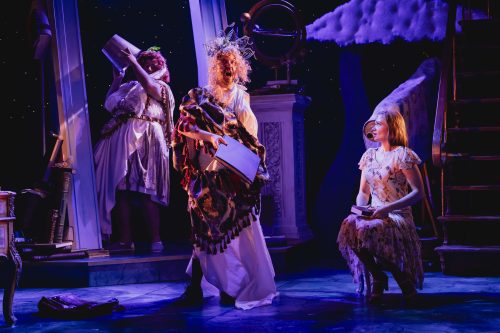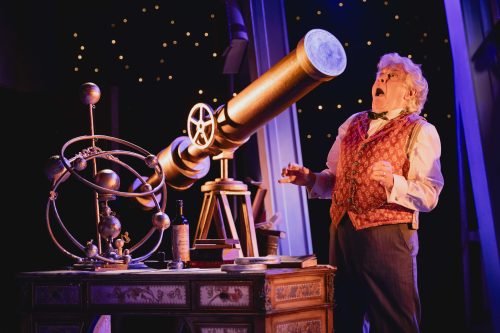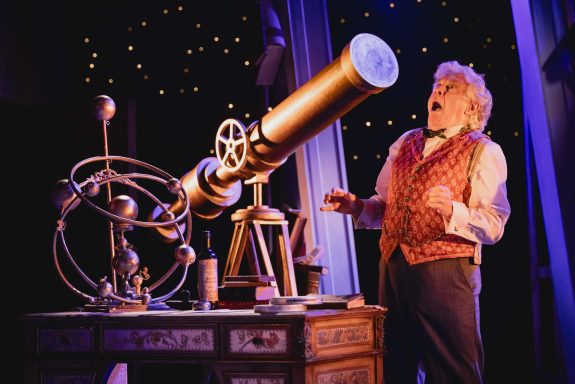 United Kingdom Paisiello/Farwell, The Fabulist: Soloists, Instrumental group. Charing Cross Theatre, London, 19.8.2024. (AK)
United Kingdom Paisiello/Farwell, The Fabulist: Soloists, Instrumental group. Charing Cross Theatre, London, 19.8.2024. (AK)

Production:
Director – John Walton
Musical Director & Orchestrator – Bobby Goulder
Movement director – Sean Kempton
Set and Costume designer – David Shields
Lighting designer – Fridthjofur Thorsteinsson
Sound designer – Andrew Johnson
Magic consultant – Harry De Cruz
Cast:
Réka Jónás – Clarice
Lily De La Haye – Cassandra
Dan Smith – Julian
James Paterson – Count Petronius
Stuart Pendred – Cardinal Bandini
Constantine Andronikou – Puppupini
Marketed on London underground station posters as a ‘playful musical with an operatic edge’, it is hard to determine the most appropriate genre for James P. Farwell’s version of Giovanni Paisiello’s opera Gli Astrologi immaginari (The Imaginary Astrologer) (1779).
Not having Paisello’s score immediately on hand, I do not know how much of his music was used or cut. However, apart from the overture, we had twenty-two musical numbers that is eleven numbers each in Act I and Act II respectively. Without having reliable information to the contrary, I assume that we heard all musical numbers from Gli Astrologi immaginari.
I do not know what Paisello’s original instrumental scoring was but here we were presented with a five-piece band, the music arranged by Bobby Goulder. It is regrettable that, although Paisello’s life and career is discussed at length in the programme notes, no information is offered about the original scoring of Gli Astrologi immaginari.
The music is lovely, similar to much good music in the eighteenth century. Furthermore, I spotted some short Mozart motives and, probably for improvisational fun, during some stage business one of the singers sang a few notes from Mozart’s Marriage of Figaro. Mozart did actually meet Paisiello and respected him; it is not far-fetched to claim that for Mozart and for many other eighteenth century (and even later) composers Paisiello was a role model.
Interestingly, it was Paisiello who first wrote an opera on Beaumarchais’s Barber of Seville – Rossini composed his version some thirty years later – which might have encouraged Mozart to set the second part of the Beaumarchais story: The Marriage of Figaro.
Whether The Fabulist is a musical, opera, operetta, Singspiel or romantic comedy, it is certainly a labour of love for James P. Farwell who is credited to have written the book and lyrics.
Long way from his day job – as expert on cyberwar and strategic communication – Farwell extended the story line to tackle Mussolini’s fascism in Italy as well as some debate about magic versus science. The love plot between the two main protagonist (Clarice and Julian) lacked credible romanticism. It seems to me that Farwell tried too many elements which were presented on the stage in too many performing styles, including what at times felt like panto.
Praise is however due to Farwell for bringing his beloved composer Paisiello to a wider audience – I for one have never even heard of Gli Astrologi immaginari – as well as to the music profession.

The cast of six singers/performers were of mixed artistic background. Some came from theatrical experience but also sang, some had operatic training but also were fluent in acting.
All six worked incredibly hard, their long verbal dialogues and slapstick stage tasks must have made it hard for them to also deliver Paisiello’s music numbers. But they delivered with credibility and honour, Paisiello would have been pleased with the singing. And so was I.
However, I am not sure what Paisiello would have thought of all singers and all instrumentalist projected via mikes. I found the slight echo produced by mikes disturbing. Admittedly, I was likely to be the minority of one in the audience who disliked the miked sound. However, I see no justification for amplification in any opera house or in any concert venue, let alone in such a small theatre with an audience capacity of about two hundred.
Would I want to see this show again? Most probably I would because of the excellent performances of the cast of six. Réka Jónás (Clarice) is a highly accomplished operatic singer, surely capable of delivering any of Mozart’s great soprano heroines. She also has stage presence and stamina to carry satisfactorily whatever stage business she is tasked with. Dan Smith (Julian) is not only a trained musical theatre actor but also a member of the Magic Circle; he delivered some magic tricks as well as, of course, singing and acting. Lily De-La-Haye (Cassandra) also comes from musical theatre but her two duets with Réka Jónás would have been more than acceptable in any opera house. Full praise is also due to Constantine Andronikou (Pupuppini), James Paterson (Count Petronius) and Stuart Pendred (Cardinal Bandini).
The show runs until 21st September, it is worth seeing for Paisiello’s music and the cast.
Agnes Kory
